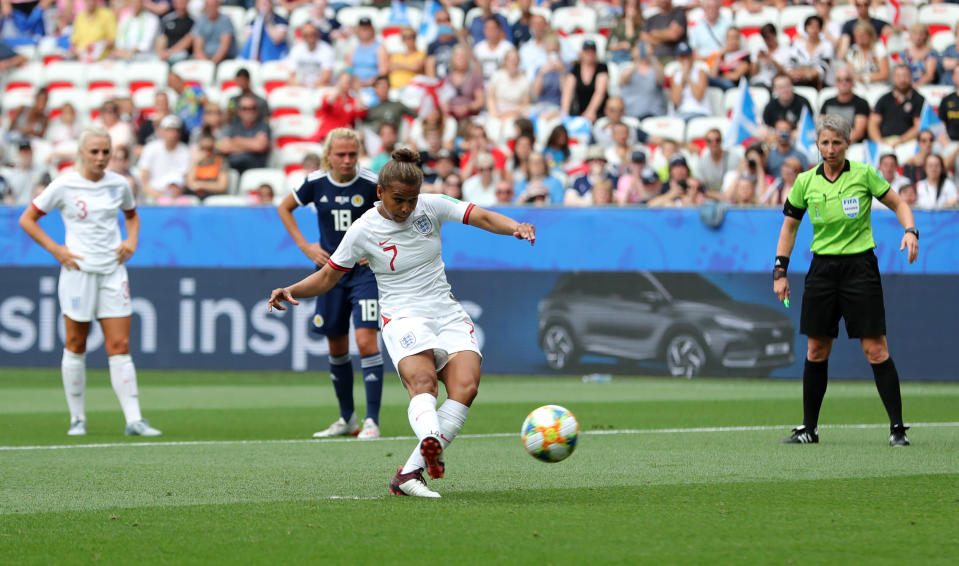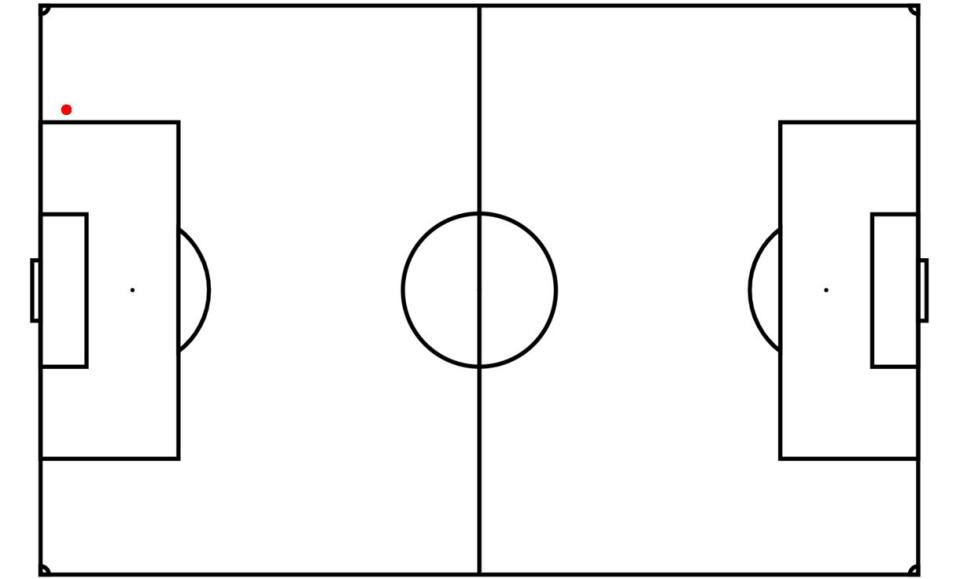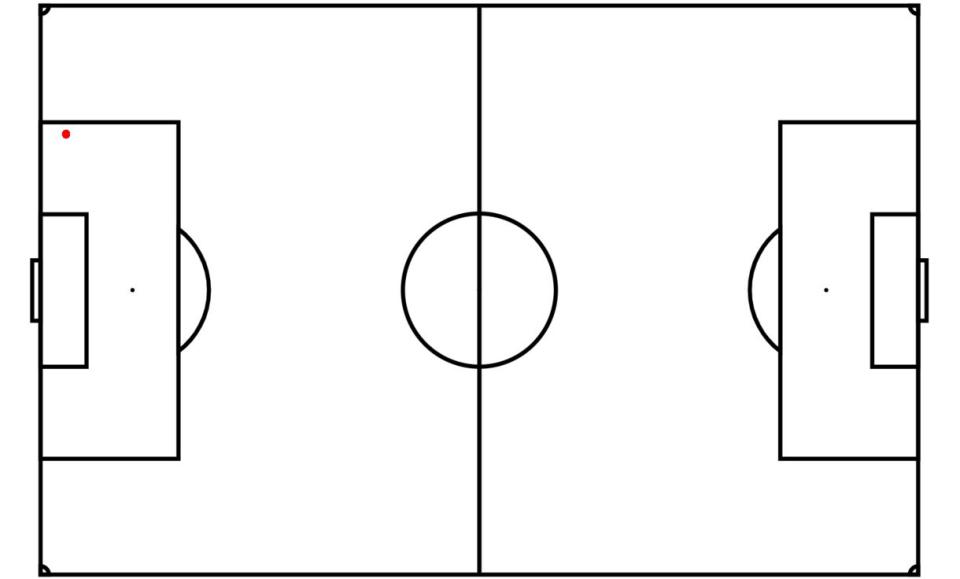Women's World Cup reffing controversies are exposing soccer's two most flawed rules

Sometimes all it takes is a spotlight.
More eyes. Higher stakes.
Sometimes they are necessary to illuminate deep-seated flaws, of which soccer has many. And already this June, in a span of nine days, two major events have done just that.
First came the Champions League final. Then, this weekend, the Women’s World Cup. Both have given rise to refereeing controversies that have an entire sport quarreling with itself. The latest came Sunday. Not 12 minutes into England’s World Cup opener against Scotland, Fran Kirby served up a cross from the edge of the penalty area.
Scottish defender Nicola Docherty was two yards away.
The ball struck Docherty’s arm.
After a video review, England was awarded a penalty.
And a wide range of emotions, from confusion to anger, swirled with equal venom across the soccer globe.
England's @Lionesses won the battle of the Auld Enemies at the #FIFAWWC
All the highlights in our 90' in 90" ⬇️ pic.twitter.com/erJBz25wwz— FOX Soccer (@FOXSoccer) June 9, 2019
Reasonable minds all agree: This should not be a handball. Certainly not in the box. There is no intent. Docherty’s arm is in a natural position. She has no time to avoid ball-to-arm contact.
And yet VAR, the video review system that has split opinions ever since it was introduced, disagreed.
So fans lashed out at it. Just as they have done for over a year now.
But VAR, a system designed to ensure rule enforcement, isn’t the problem. The rules themselves are.
VAR has exposed the handball rule ...
VAR isn’t ruining soccer. It’s actually exposing two glaring flaws that have existed in the sport’s rulebook for decades. Only now, with any contentious incident rolled back 10 times in slo-mo and re-litigated, are those flaws coming to light.
The handball rule has been murky for over a century. Enforcement was largely governed by unwritten interpretation. The law keys in on the word “deliberate,” but nobody quite knew how to define “deliberate.” In commentary booths and on social media, “unnatural position” entered the lexicon, but there is no specific definition for that either.
The vagueness allowed referees to make calls situationally, narrowing those definitions in penalty boxes and widening them in midfield. The gray areas were endless and problematic, but the equilibrium palatable – because ignored handballs in 18-yard boxes, provided they didn’t deny clear goalscoring opportunities, were far less impactful than penalized ones.
But VAR has stripped referees of their interpretive leeway. It has lent power to a rulebook built on ambiguous foundations, incapable of handling the responsibility.
The result is madness – madness that extends beyond the handball rule, into a broader domain: the penalty.
... And, more broadly, the penalty rule
The real problem here isn’t specific to handballs. It’s that when they occur in the area, the punishment doesn’t fit the crime.
That cross that Kirby hit on Sunday? Had it not been blocked, its expected value was still a tiny fraction of a goal. Because it happened to strike a Scottish arm, its worth multiplied exponentially, to roughly 0.75 goals – or whatever Nikita Parris’ penalty conversion rate is.
That, when you think about it, is completely absurd. It’s mind-bogglingly stupid. Illogical. Backwards.
The incentives are so perverse that players in Kirby’s position, or Sadio Mane’s eight days earlier, will soon come to realize: Aiming for an opponent’s arm is a more effective strategy than trying to pick out a teammate at the back post. Mane probably didn’t do that last Saturday, but he might as well have.
Is this how we want the beautiful game to be played?
A PENALTY CALL 23 SECONDS IN 😱 pic.twitter.com/4gAaYBhPFG
— Bleacher Report Live (@brlive) June 1, 2019
A similar incentive already compels forwards to hurl themselves to the ground under minimal contact rather than have an off-balance shot at goal. It’s an awful trend – but, from a player’s perspective, a rational one.
The onus, therefore, isn’t on them to reform their ways. It’s on soccer’s lawmakers to rethink a rule that is only in place because, well, it has been since the 1890s. And because this sport is so senselessly resistant to change.
How the penalty rule should be overhauled
The penalty box is an extremely arbitrary thing. Why, for example, should a foul occurring here be a free kick from this exact position ...

... but a foul occurring here be an unobstructed one, 12 yards out from the center of the goal?

The 18-yard box itself can remain for goalkeeper handling purposes. But any foul, handball or otherwise, that does not deny a clear goalscoring opportunity should simply be a direct free kick from the spot of the foul.
The only other tweak required would be an expansion of the definition of “denying a clear goalscoring opportunity,” enough to discourage pervasive tactical fouling. This would make punishments proportional to crimes.
How the handball rule should be changed
As for the handball rule, its scope should be reduced. Only intentional ones should be whistled, no matter where on the field they occur. As long as players aren’t swatting at balls, or blocking them like a keeper would, or picking them up and running like an American footballer would, why, exactly, do we need to police them so strictly?
Now, “intentional,” to be clear, would include even the slightest instinctive movement of the arm into a position that could possibly make it more likely to come into contact with the ball. But that 50/50 challenge in midfield where the ball randomly pops up and hits an arm? Please, just play on. Even if it puts the handling player at a disadvantage.
But this is the less important suggestion. The penalty rethink is urgent.
VAR, for the most part, has worked. It corrects egregious errors. Unfortunately, itcame with unintended consequences. Those consequences, however, can largely be remedied with a change that, frankly, is long overdue.
We just needed major tournaments and VAR to make us realize as much.
– – – – – – –
Henry Bushnell is a features writer for Yahoo Sports. Have a tip? Question? Comment? Email him at henrydbushnell@gmail.com, or follow him on Twitter @HenryBushnell, and on Facebook.


